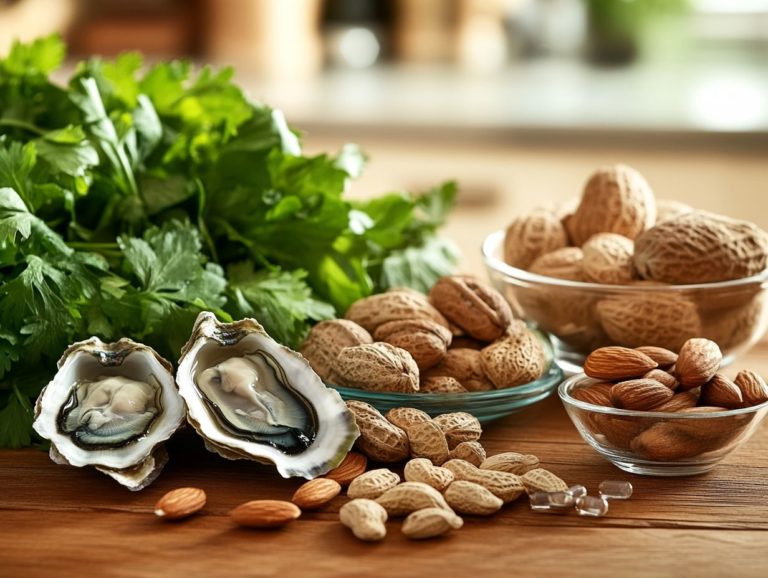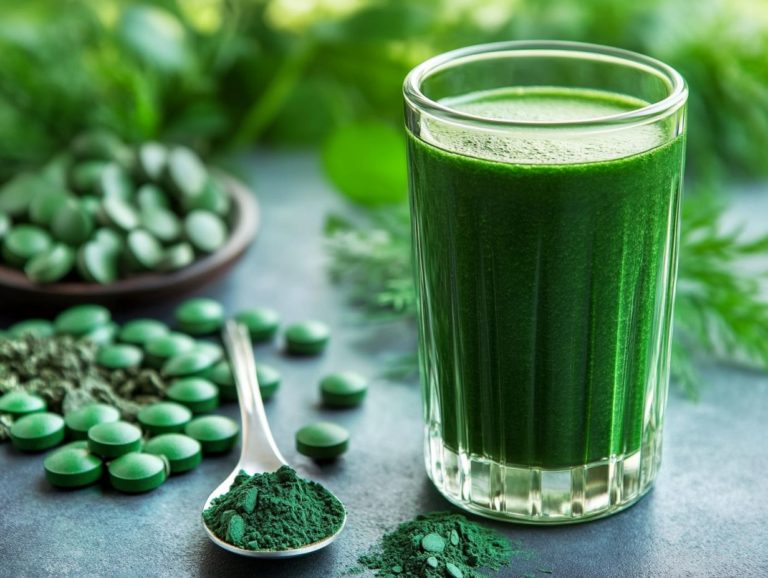Are Protein Powders Effective for Weight Loss?
Protein powders have emerged as a popular supplement for those looking to shed pounds, but their effectiveness can truly vary.
This article delves into the different types of protein powders available and how they can support your weight loss journey. It highlights the crucial role protein plays in weight management and provides tips for selecting the right option for you.
It also discusses potential side effects and gives you tasty ways to include protein powders in your diet. Unlock the full potential of this powerful tool and transform your health today!
Contents
- Key Takeaways:
- Understanding Protein Powders
- How Protein Powders Aid Weight Loss
- Choosing the Right Protein Powder for Weight Loss
- Potential Side Effects of Protein Powders
- Incorporating Protein Powders into Your Weight Loss Plan
- Frequently Asked Questions
- Are Protein Powders Effective for Weight Loss?
- What types of protein powders are best for weight loss?
- How should I use protein powder for weight loss?
- Can protein powders help with muscle building while losing weight?
- Are there any potential downsides to using protein powders for weight loss?
- Do protein powders have any other health benefits besides weight loss?
Key Takeaways:

1. Protein powders can be effective for weight loss because they provide a concentrated source of protein, helping you feel full and boosting your metabolism.
2. When choosing a protein powder for weight loss, consider your dietary needs, taste preferences, and any potential allergies.
3. To avoid potential side effects, follow recommended serving sizes and consult with a healthcare professional if you have any concerns.
Understanding Protein Powders
Protein powders serve as concentrated sources of dietary protein from different food sources. They can play a crucial role in your nutrition plan, particularly if you’re aiming to boost muscle mass or elevate your protein intake within a balanced diet.
These supplements typically feature a blend of whey, casein, soy, and plant-based proteins like pea and rice, catering to various dietary preferences.
Types of Protein Powders
You ll find an impressive array of protein powders on the market, each from different sources like whey, casein, and a range of plant-based options such as hemp, soy, rice, and pea.
This variety caters to a range of dietary needs and preferences. They differ not just in taste and texture, but also in their nutritional profiles and benefits.
Whey protein is renowned for its rapid absorption, making it a stellar choice for post-workout recovery and muscle repair. In contrast, casein protein digests more slowly, making it perfect for overnight recovery or as a meal replacement.
Plant-based options deliver essential amino acids while offering added nutrients like fiber and antioxidants, enhancing your overall health.
By incorporating these diverse protein sources into your daily nutrition, you can significantly boost protein intake and support your body s muscle-building process.
How Protein Powders Aid Weight Loss
Protein powders can be key in your weight loss strategy. They promote a sense of fullness and help preserve muscle while boosting energy expenditure.
By adding them to your diet, you can effectively maintain the calorie deficit crucial for successful weight management.
Role of Protein in Weight Loss

Protein plays an essential role in weight loss by preserving muscle and helping you feel full, which aids in maintaining a healthy calorie deficit.
Research shows that protein effectively promotes feelings of fullness more than fats and carbohydrates. This can lead to lower calorie intake throughout the day, making protein an essential part of any weight loss plan.
Nutrition guidelines recommend that if you’re looking to shed some pounds, aim for 1.2 to 2.0 grams of protein per kilogram of your body weight daily to optimize muscle retention and feeling full.
By integrating lean protein sources like chicken, legumes, and fish into your meals, you can enhance your dietary satisfaction while effectively supporting your weight loss goals.
Benefits of Protein Powders for Weight Loss
Protein powders present a wealth of benefits for anyone aiming for weight loss. They serve as convenient meal replacements, support muscle mass maintenance, and provide a simple way to meet your daily protein intake goals.
In a world where your schedule is often packed, these powders can be effortlessly mixed into shakes or smoothies, making them an ideal choice for nutrition on the go. Protein powders help you feel full longer while promoting fat loss.
For those managing weight more effectively, incorporating protein powders into your diet can enhance your sense of fullness, ultimately leading to a reduction in calorie intake from other food sources.
This practical strategy aligns with your fitness aspirations and establishes a solid foundation for healthier eating habits.
Choosing the Right Protein Powder for Weight Loss
Choosing the right protein powder for weight loss is crucial for enhancing your nutritional strategy. It should seamlessly align with your dietary requirements, protein content preferences, and health goals.
Factors to Consider
When selecting a protein powder, consider several key factors, including protein content, the type of protein, your dietary needs, and any potential food allergies.
Your protein content should match your personal fitness goals, whether you re aiming for muscle gain, weight loss, or overall health. If your focus is on muscle growth, you might want to lean towards powders that are high in branched-chain amino acids (BCAAs), which are important nutrients that help your muscles recover after exercise.
The type of protein you choose is also vital. You have options ranging from whey, known for its rapid absorption, to plant-based sources like pea or hemp protein, perfect for vegans or those who are lactose intolerant.
If you have unique dietary restrictions, such as gluten sensitivity or nut allergies, it s essential to check labels meticulously to avoid any adverse reactions.
Lastly, think about how you can seamlessly incorporate these proteins into your daily meals perhaps by adding them to smoothies or oatmeal. This way, you re tailoring your nutrition to your needs and making it enjoyable.
Potential Side Effects of Protein Powders

While protein powders can offer significant benefits, be aware of their potential side effects. These may include digestive discomfort and reactions, especially for individuals with food allergies.
It’s crucial to notice these side effects quickly so you can adjust your intake.
Common Side Effects
Common side effects of protein powders may include digestive discomfort, bloating, and various issues related to food allergies, affecting users to varying degrees.
You might find that digestive discomfort is frequent, particularly with whey protein, which can trigger symptoms like gas and cramps. Bloating often follows, usually due to excessive protein intake or intolerances to specific ingredients.
If you have food allergies, you might be sensitive to components like lactose or soy. It’s important to listen to your body s signals after consumption.
To minimize potential risks, consider starting with small doses and consulting a registered dietitian. They can help you develop a tailored protein intake plan that aligns with your individual nutritional needs and sensitivities.
Incorporating Protein Powders into Your Weight Loss Plan
Incorporating protein powders into your weight loss plan can be a highly effective strategy. Not only does it enhance your protein intake, but it also helps manage hunger while ensuring a nutrient balance that supports your overall health and wellness.
Start exploring how protein powders can transform your weight loss journey today!
Tips and Recipes
Integrate protein powders into your diet for weight loss with these simple tips and recipes. They can elevate high-protein foods in your daily routine.
Explore a variety of meals to enhance flavor and nutrition. Start your day right by adding protein powder to your morning smoothies.
Blend it with fruits and leafy greens for a nutrient-dense breakfast that fuels your body.
For snacks, why not whip up some homemade protein bars? Get creative! Customize your bars with oats, nut butter, and your choice of protein for a quick energy boost.
You can also add protein powder to baked goods like muffins and pancakes. This enhances their nutrition while satisfying your sweet tooth.
These options contribute to your protein intake and cater to dietary preferences such as gluten-free or vegan, ensuring everyone can benefit.
Frequently Asked Questions

Are Protein Powders Effective for Weight Loss?
Yes, protein powders can help with weight loss when used correctly. They increase protein intake, which helps you feel full and preserves muscle mass.
What types of protein powders are best for weight loss?
Whey, casein, and plant-based protein powders like pea or soy are great choices. They are usually low in calories but high in protein, perfect for your weight loss goals.
How should I use protein powder for weight loss?
Use protein powder as a meal replacement or a post-workout snack. For the best results, consume it within 30 minutes after exercising.
You can also add it to smoothies or oatmeal for a filling, high-protein meal.
Can protein powders help with muscle building while losing weight?
Yes, they can support muscle building while losing weight. Protein powders provide essential building blocks for muscle growth and repair, especially when combined with strength training.
Are there any potential downsides to using protein powders for weight loss?
While effective, choose high-quality protein powder and use it in moderation. Too much protein can lead to weight gain and digestive discomfort for some people.
Do protein powders have any other health benefits besides weight loss?
Yes! Protein powders can improve muscle strength, support bone health, and aid post-surgery recovery. They also help vegetarians and vegans meet their protein needs conveniently.






